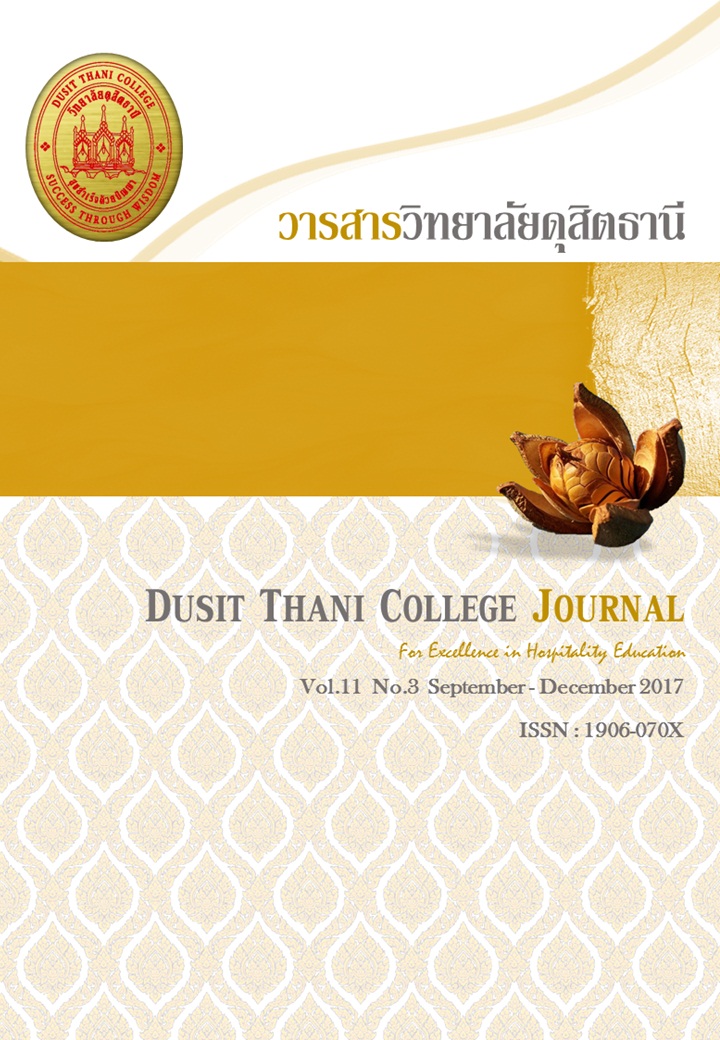การพัฒนาแบบวัดการปฏิบัติงานตามการเปลี่ยนแปลงของพนักงานโรงแรม
Main Article Content
บทคัดย่อ
การศึกษาครั้งนี้มีวัตถุประสงค์เพื่อพัฒนาแบบวัดการปฏิบัติงานตามการเปลี่ยนแปลงให้มีคุณภาพเที่ยงตรง และเชื่อถือได้ ประชากรในการศึกษาครั้งนี้ คือ พนักงานที่ปฏิบัติงานในส่วนหน้า (Front Office Operations) ของโรงแรมที่มีมาตรฐานโรงแรมระดับ 5 ดาว ในเขตกรุงเทพมหานคร กลุ่มตัวอย่างคือ พนักงานปฏิบัติงานส่วนหน้าของโรงแรมในเขตกรุงเทพมหานคร จำนวน 280 คน เก็บข้อมูลด้วยแบบวัดการปฏิบัติงานตามการเปลี่ยนแปลง ซึ่งได้รับการตรวจสอบความเที่ยงตรงเชิงเนื้อหาจากผู้ทรงคุณวุฒิ และมีค่าความเชื่อมั่นทั้งฉบับอยู่ที่ 0.81 ผลการศึกษาโดยการวิเคราะห์องค์ประกอบเชิงยืนยันพบว่า การปฏิบัติงานตามการเปลี่ยนแปลงประกอบด้วย 5 องค์ประกอบ คือ การแก้ไขปัญหาอย่างสร้างสรรค์ การเผชิญหน้ากับสถานการณ์ที่ไม่ได้คาดคิด ความสามารถในการปรับตัวระหว่างบุคคล ความมุ่งมั่นในการเรียนรู้ และการจัดการความเครียด พบว่า มีความเที่ยงตรงเชิงเสมือน (Convergent Validity) และมีความเชื่อมั่นในการวัดตัวแปรแฝง (Construct Reliability) ในระดับที่เชื่อถือได้โดยมีค่าความเชื่อมั่นในการวัดตัวแปรแฝงอยู่ระหว่าง 0.80 ถึง 0.91
Article Details
นโยบายการพิจารณากลั่นกรองบทความ
- บทความวิจัยและบทความวิชาการทุกเรื่องที่จะได้รับการตีพิมพ์ต้องผ่านการพิจารณากลั่นกรองโดยผู้ทรงคุณวุฒิ (Peer Review) ในสาขาที่เกี่ยวข้อง จำนวน 3 ท่าน/บทความ
- บทความ ข้อความ ภาพประกอบและตารางประกอบที่ลงตีพิมพ์ในวารสารเป็นความคิดเห็นส่วนตัวของผู้เขียน กองบรรณาธิการไม่จำเป็นต้องเห็นด้วยเสมอไป และไม่มีส่วนรับผิดชอบใด ๆ ถือเป็นความรับผิดชอบของผู้เขียนแต่เพียงผู้เดียว
- บทความที่จะได้รับการตีพิมพ์จะต้องไม่เคยตีพิมพ์ เผยแพร่ที่ใดมาก่อน และไม่อยู่ระหว่างการพิจารณาของวารสารฉบับอื่น หากตรวจสอบพบว่ามีการตีพิมพ์ซ้ำซ้อน ถือเป็นความรับผิดชอบของผู้เขียนแต่เพียงผู้เดียว
- บทความใดที่ผู้อ่านเห็นว่าได้มีการลอกเลียนหรือแอบอ้างโดยปราศจากการอ้างอิง หรือทำให้เข้าใจผิดว่าเป็นผลงานของผู้เขียน กรุณาแจ้งให้กองบรรณาธิการวารสารทราบจะเป็นพระคุณยิ่ง
เอกสารอ้างอิง
Contextually relevant future performance. International Journal of Selection and Assessment, 7, 97–111.
Borman, W. C. & Motowidlo, S. J. (1993). Expanding the criterion domain to include elements of
contextual performance. In N. Schmitt, & W. C. Borman (Eds.), In Personnel selection in organizations (pp. 71-98). SanFrancisco: Jossey-Bass.
Calarco, H. N. (2016). Measuring the Relationship between Adaptive Performance and Job
Satisfaction. A Dissertation for the degree of Doctor of Arts in Industrial/Organizational Psychology, Middle Tennessee State University, USA.
Campbell, J. P. (1990). Modeling the performance prediction problem in industrial and organizational psychology. In M. D. Dunnette & L. M. Hough (Eds.), Handbook of industrial and
organizational psychology. (2nd ed., Vol. 1). Palo Alto, CA: Consulting Psychologists Press.
Campbell, J. P. et al. (1993). A Theory of Performance. In Personnel Selection in Organizations. Edited by N. Schmitt; & W. C. Borman (Eds.). pp. 35-70. San Francisco: Jossey-Bass.
Charbonnier-Voirin, A. Akremi, A. & Vanderberghe, C. (2010). A Multilevel Model of
Transformational Leadership and Adaptive Performance and the Moderating Role of Climate for Innovation. Group & Organization Management. 35(6): 699-726.
Charbonnier-Voirin, A. & Roussel, P. (2012). Adaptive Performance: A New Scale to Measure
Individual Performance in Organizations. Canadian Journal of Administrative Science. 29: 280-293.
Department of Tourism of Thailand. (2016). Hotel. (22 August 2559). Retrieved from
https://thai.tourismthailand.org. (In Thai)
Griffin, B. & Hesketh, B. (2003). Adaptable Behaviours for Successful Work and Career
Adjustment. Australia Journal of Psychology. 55(2): 65-73.
_________________. (2005). Are Conscientious Workers Adaptable. Australia Journal of
Management. 30(2): 245-259.
Hesketh, B. & Neal, A. (1999). Technology and Performance. In the Changing Nature of
Performance: Implications for Staffing, Motivation, and Development. Edited by D. R.
Ilgen; & E. D. Pulakos (Eds.) pp. 21-55. San Francisco: Jossey-Bass.
Meesutha, A. & Satchukorn, S. (2010). Performance Appraisal. (17thed.) Bangkok:
Technology Promotion Association Press. (Thailand – Japan) (In Thai)
Ployhart, R. E. & Bliese, P. D. (2006). Individual Adaptability (I-ADAPT) Theory: Conceptualizing
the Antecedents, Consequences, and Measurement of Individual Differences in Adaptability, in C. Shawn Burke, Linda G. Pierce, Eduardo Salas (ed.) Understanding Adaptability: A Prerequisite for Effective Performance within Complex Environments (Advances in Human Performance and Cognitive Engineering Research, Volume6) Emerald Group Publishing Limited, pp.3 – 39.
Pulakos, E. D. et al. (2000). Adaptibility in the Workplace: Development of a Taxonomy of
Adaptive Performance. Journal of Applied Psychology. 85(4): 612-624.
Pulakos, E. D. et al. (2002). Predicting Adaptive Performance: Further Tests of a Model of Adaptibility. Human Performance. 15(4): 299-323.
Supattra S. (2010). Hotel Management. Khon Kaen: Khon Kaen University Press.
Tabachnick, B. G.; & Fidell, L. S. (1996). Using Multivariate Statistics. 3rded. New York: Harper
Collins.


